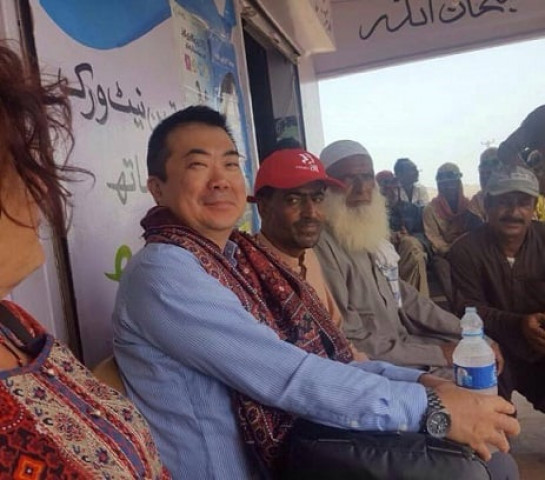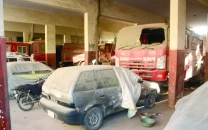Workers' rights: 'Pakistan has very low safety standards'
Head of shipbreaking and shipbuilding at IndustriALL Global Union, Kan Matsuzaki, speaks to The Express Tribune

Kan Matsuzaki, head of shipbreaking and shipbuilding at IndustriALL Global Union. PHOTO: COURTESY NTUF
He was referring to his visit to Gadani where on November 1 last year 26 workers were killed and several others were injured after a decommissioned oil tanker caught fire during dismantling. The incident sparked uproar across the world, as the authorities struggled with the 100 metre high flames that engulfed the ships for four days.
Zehri suspends ship-breaking at Gadani yard
This was Matsuzaki's second visit to the country and he was seemingly disappointed with the lack of attention being given by the government and employers to the rights and safety of workers. "I visited Gadani in late 2013 and four years later I see nothing has changed," Matsuzaki lamented.
"Last time, I saw workers waiting for a doctor to come to the small hospital established there and I saw that this time again," he said.
IndustriALL is one of the largest global union federations with a membership of over 50 million from 140 countries, according to its website. The Geneva-based federation claims to fight for "another model of globalisation and a new economic and social model that puts people first, based on democracy and social justice".
Mentioning the importance of international and regional cooperation to improve working conditions, Matsuzaki cited the example of India as the leader of the shipbreaking industry in terms of workers' rights, safety and workplace conditions and commented that Pakistan fell into the worst category because of its approach towards unions, among other things.
Another worker dies in Gadani
"There are many countries where non-union governments exist, like it is here and was in India. However, India improved considerably and so did its shipbreaking industry in Alang, Gujarat after the government coordinated with the unions," he said, estimating a rise of 15,000 members in the shipbreaking union in a decade.
He compared the approach of the two countries and said that earlier in India the authorities, including police, would halt the activities of unions and put a virtual ban on them but later they realised that it was inevitable to coordinate with unions, ie workers, for a better tomorrow.
He said that after the November 1 tragedy, IndustriALL, through its affiliates in the country, pushed the government to revise its safety laws. "Pakistan basically has very low standards of safety in its national law. That's why we asked it to ratify the Hong Kong convention on shipbreaking but one also needs to look at its implementation," he said.
Dangerous working conditions at Gadani
Meanwhile, Suzana Miller, the global projects and rights officer with IndustriALL, added that politically, there is a misconception or perhaps a lack of knowledge about unions.
"Even the International Monetary Fund and World Bank say that economies that work the best are the ones that recognise unions," she said.
"We have the example of the Swedish prime minister who is part of our executive council. When a company is led by a union-oriented prime minister, I don't think people would be complaining. It is a question of educating the government and employers, not only the workers, on working together for a better world."
She added that after working with the unions in India for years, her federation learned that unions, such as those in Alang, which is a similar remote town like Gadani, should be connected with those in Mumbai so that their news is broadcasted.
Gadani’s ship-breaking workers threaten to go on strike
"It was horrific to imagine that people were burnt for four days. They jumped off the ships to save their lives. People don't realise what is happening in Gadani unless there is a disaster," she said.
Miller said that she told the Gadani workers - in a bid to express solidarity with them - that they were not alone and needed to understand their goals and rights together. "There is a dire need for a regional alliance, but unfortunately in the case of Pakistan, India and Bangladesh, the countries are blocked. So we need creative ways to connect."
Stressing the need of unionisation, the IndustriALL delegate visiting the country said that unions should work in collaboration with each other towards a common goal.



















COMMENTS
Comments are moderated and generally will be posted if they are on-topic and not abusive.
For more information, please see our Comments FAQ